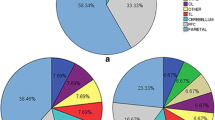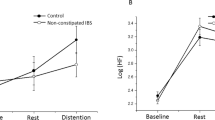Abstract
We studied differences in rectal tone between healthy controls, nonpsychiatric irritable bowel syndrome (IBS) patients, and IBS patients with comorbid phobic anxiety disorders to assess the impact of psychiatric comorbidity on rectal tone. The groups were additionally compared with respect to brain information processing of everyday words with emotional content to see if we could identify an association between perception of emotional material in the brain and rectal tone. We found that both nonpsychiatric IBS patients and IBS patients with phobic anxiety disorder had increased baseline rectal tone compared with healthy controls (F = 9.81, P < 0.001). The phobic anxiety patients tended to have increased tone compared with nonpsychiatric IBS patients, but the difference did not reach statistical significance. Similar differences were found in the attentional elements of brain information processing activity assessed by event-related potentials. Rectal tone significantly predicted brain reactivity to emotional words, suggesting that changes in intestinal motor function may influence brain perception.
Similar content being viewed by others
REFERENCES
Camilleri M, Neri M: Motility disorders and stress. Dig Dis Sci 34:1777-1786, 1989
Farthing MJG: Irritable bowel, irritable body, or irritable brain? BMJ 310:171-175, 1995
Gorard DA, Farthing MJ: Intestinal motor function in irritable bowel syndrome. Dig Dis Sci 12:72-84, 1994
Dancey CP, Taghavi M, Fox RJ: The relationship between daily stress and symptoms of irritable bowel: A time-series approach. J Psychosom Res 44:537-545, 1998
Narducci F, Snape WJ, Battle WM, London RL, Cohen S. Increased colonic motility during exposure to a stressful situation. Dig Dis Sci 30:40-44, 1985
Welgan P, Meshkinpour H, Beeler M: Effect of anger on colon motor and myoelectric activity in irritable bowel syndrome. Gastroenterology 94:1150-1156, 1988
Fullwood A, Drossman DA: The relationship of psychiatric illness with gastrointestinal disease. Annu Rev Med 46:483-496, 1995
Hammer HF, Phillips SF, Camilleri M, Hanson RB: Rectal tone, distensibility, and perception: Reproducibility and response to different distentions. Am J Physiol 274:G584-G590, 1998
Magee WJ, Eaton WW, Wittchen HU, McGonagle KA, Kessler RC: Agoraphobia, simple phobia, and social phobia in the National Comorbidity Survey. Arch Gen Psychiatry 53:159-168, 1996
Blomhoff S, Jacobsen M, Spetalen S, Dahm A, Malt UF: Brain information processing: The core of the irritable bowel syndrome? (Scand J Gastroenterol (in press)
Thompson WG, Dotevall G, Drossman DA, Heaton KW, Kruis W: Irritable bowel syndrome: Guidelines for the diagnosis. Gastroenterol Int 2:92-95, 1989
American Psychiatric Association: Diagnostic and Statistical Manual of Mental Disorders. 4th ed. Washington, DC: American Psychiatric Press, 1994
Sheehan D, Lecrubier Y, Janavs J, Knapp E, Weiller E, Bonora LI, Amorim P, Lepine JP, Sheehan MF, Baker RR, Sheehan KH: Mini International Neuropsychiatric Interview (M.INI). University of South Florida Institute for Research in Psychiatry, Tampa, Florida and INSERM-Hôpital de la Salpe´trie re, Paris, France, 1994
Zigmond AS, Snaith RP: The hospital anxiety and depression scale. Acta Psych Scand 67:361-370, 1983
Buss AH, Perry M: The Aggression Questionnaire. J Pers Soc Psychol 63:452-459, 1992
Hugdahl K: Psychophysiology. The Mind-Body Perspective. Cambridge, Massachusetts, Harvard University Press, 1995
Spielberger CD, Gorsuch RL, Lushene RE: STAI manual for the State-Trait Inventory. Palo Alto, California, Consulting Psychologists Press, 1970
Montgomery SA, Aasberg M: A new depression scale designed to be sensitive to change. Br J Psychiatry 134:382-389, 1979
Buss AH, Durkee A: An inventory for assessing different kinds of hostility. J Consult Clin Psychol 21:343-349, 1957
Jasper HH: The ten-twenty Electrode system of the international federation. Electroencephalogr Clin Neurophysiol 10:371-375, 1958
Semlitsch HV, Anderer P, Schuster P, Presslich O: A solution of reliable and valid reduction of ocular artefacts, applied to the P300 ERP. Psychophysiology 23:695-703, 1986
Holcomb PJ, Neville HJ: Natural Speech processing: An analysis using event-related brain potentials. Psychobiology 19:286-300, 1991
Johnson R: A triarchic model of P300 amplitude. Psychophysiology 23:367-384, 1986
Kutas M, Hillyard SA: Reading senseless sentences: Brain potentials reflect semantic incongruity. Science 207:203-205, 1980
Donchin E, Coles MG: Is the P300 component a manifestation of context updating? Behav Brain Sci 11:357-427, 1988
Blomhoff S, Spetalen S, Jacobsen M, Vatn M, Malt UF: Rectal wall reactivity and brain information processing of words with emotional content Dig Dis Sci 45:1155-1160, 2000
Rao SS, Hatfield RA, Suls JM, Chamberlain MJ: Psychological and physical stress induce different effects on human colonic motility. Am J Gastroenterol 93:985-990, 1998
Poynard T, Naveau S, Mory B, Chaput JC: Meta-analysis of smooth muscle relaxants in the treatment of irritable bowel syndrome. Aliment Pharmacol Ther 8:499-510, 1994
Coffman JA, Torello MW, Lewis CE, Fortin LD, Martin DJ: Event-related brain potentials in depressed patients treated with electroconvulsive therapy. Prog Neuropsychopharmacol Biol Psychiatry 13:687-692, 1989
Burkhart MA, Thomas DG: Event-related potential measures of attention in moderately depressed subjects. Electroencephalogr Clin Neurophysiol 88:42-50, 1993
Rodríguez LAG, Ruigómez A: Increased risk of irritable bowel syndrome after bacterial gastroenteritis: cohort study. BMJ 318:565-566, 1999
Gwee K-A, Leong Y-L, Graham C, McKendrick MW, Collins SM, Walters SJ, Underwood JE, Read NW: The role of psychological and biological factors in postinfective gut dysfunction. Gut 44:400-406, 1999
Houghton LA, Whorwell PJ: Opening the doors of perception in the irritable bowel syndrome. Gut 41:567-568, 1997
Segalowitz SJ, Barnes KL: The reliability of ERP components in the auditory oddball paradigm. Psychophysiology 30:451-459, 1993
Kinoshita S, Inoue M, Maeda H: Long-time patterns of change in ERPs across repeated measurements. Physiol Behav 4:1087-1092, 1996
Author information
Authors and Affiliations
Rights and permissions
About this article
Cite this article
Blomhoff, S., Spetalen, S., Jacobsen, M.B. et al. Rectal Tone and Brain Information Processing in Irritable Bowel Syndrome. Dig Dis Sci 45, 1153–1159 (2000). https://doi.org/10.1023/A:1005550002622
Issue Date:
DOI: https://doi.org/10.1023/A:1005550002622




